how an Argentine comic resonates today
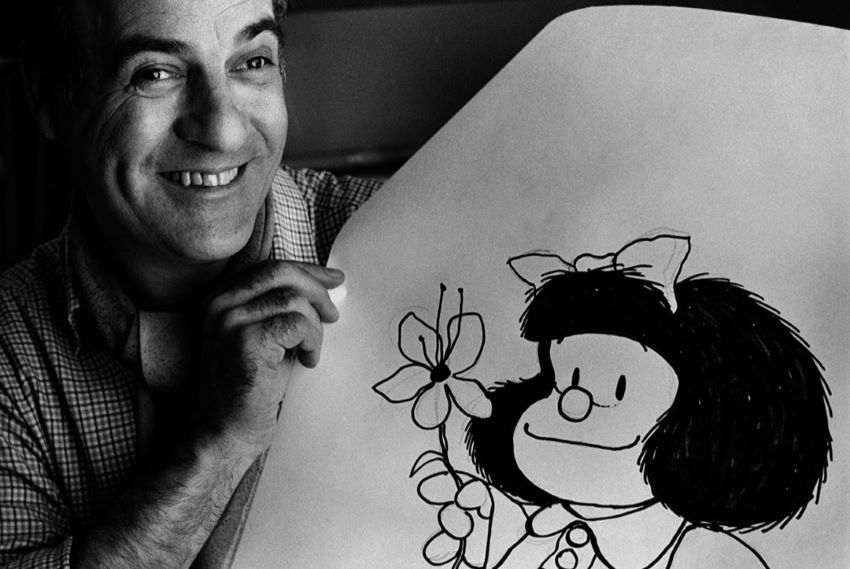
I’ve seen her around Mexico, and you probably have too.
She’s a dark-haired six-year-old with a round face and expressive eyes. Though she’s typically spotted in a signature red dress and matching bow, she’s been known to change it up now and again. She’s almost a scribble in her visual simplicity. She has an aversion to soup and strong opinions on important world issues. A voice for the younger generations, she’s witty and insightful, with critical perspectives on adult society. She’s especially known for her rebellious spirit and fierce rejection of societal norms and expectations.
I’m referring to Mafalda, the comic book-turned-cartoon character beloved by generations of Mexicans, Latin American populations, and numerous others worldwide.
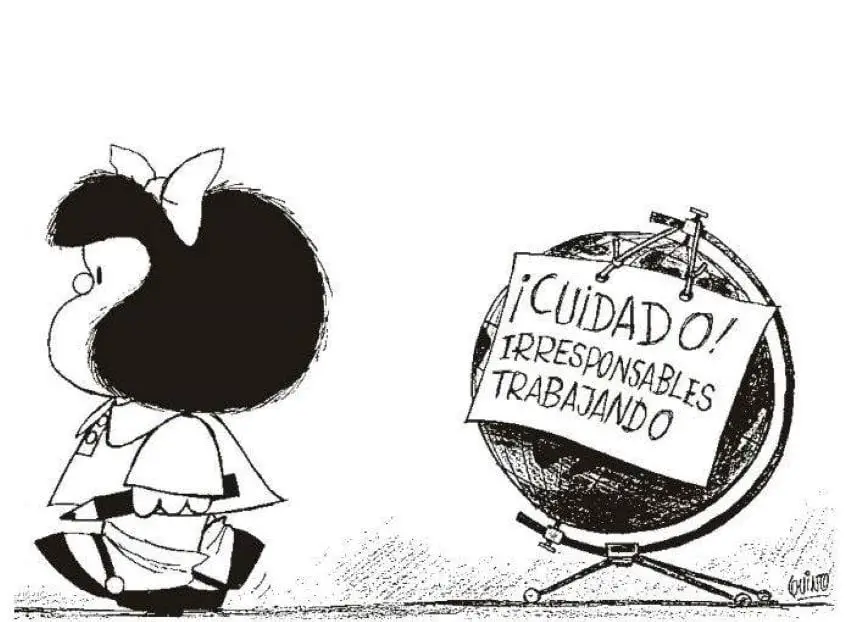
Created in 1964 by Argentine cartoonist Joaquín Salvador Lavado Tejón (better known as Quino), Mafalda began life as an advertising mascot for the appliance company Siam Di Tella. But she quickly outgrew her commercial roots, evolving into a cultural phenomenon that continues to resonate with audiences today. In Mexico, her popularity is comparable to that of Charlie Brown or Garfield, cementing her status as one of the Spanish-speaking world’s most iconic characters.
The birth of a pint-sized icon
At first glance, Mafalda appears to be a typical six-year-old girl from a middle-class Argentine family of the 1960s. Her father works a mundane office job and her mother tends to the home. At the same time, her relationship with her younger brother Guille reflects the typical mix of sibling rivalry and affection. The family dynamic embodies societal norms of the time, but beneath this veneer of normalcy lies Mafalda’s sharp wit and a deeply inquisitive mind that constantly challenges the status quo.
While Mafalda engages in typical childhood activities — school and playing with friends — her innocently presented perspectives often have a philosophical bent. Throughout her daily life, Mafalda reflects on various social issues, expressing her thoughts through musings and humorous observations. An avid reader, she stays informed about current events, which fuels her desire for justice and change.
Contrasting opinions: Mafalda’s social circle
Mafalda’s world is populated by a colorful cast of characters who serve as contrasts for her progressive ideals. There’s Susanita, the materialistic girl who dreams of landing a wealthy husband and having lots of babies. Mafalda’s interactions with her friend frequently involve her challenging Susanita’s views on marriage, beauty standards, and the role of women in society. When Susanita expresses her desire to marry a wealthy man, Mafalda questions her motivations and encourages her to pursue her own goals. “Para qué ser mamá? No es la única meta en la vida.” (“Why be a mom? It’s not the only goal in life.”)
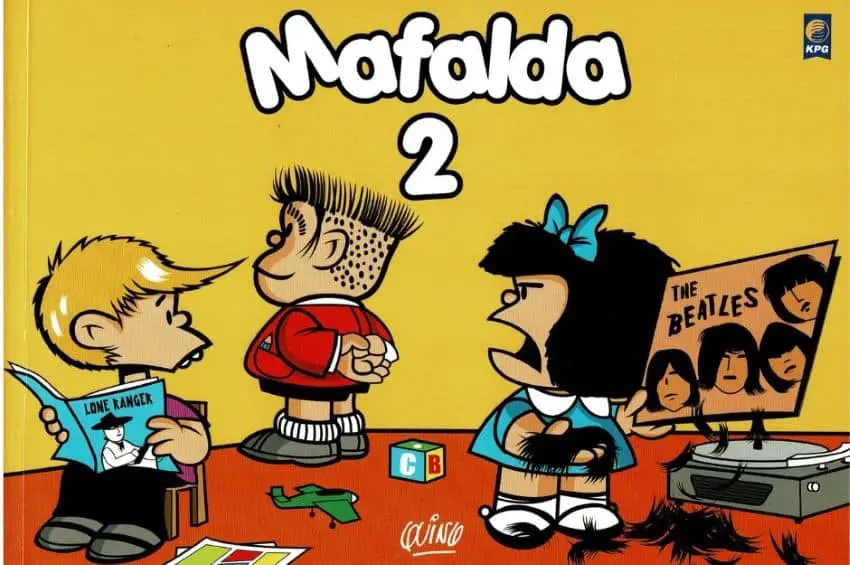

Manolito, the son of a shopkeeper, is obsessed with money and business. Mafalda’s and Manolito’s debates about capitalism, consumerism, and social inequality are recurring themes. In one exchange, Mafalda argues that Manolito’s family’s wealth is not earned through hard work alone but rather through the exploitation of the working class. “No se puede ser rico sin hacerle daño a otros.” (“You can’t be rich without harming others.”)
Felipe, the romantic daydreamer and the most introspective of Mafalda’s friends, provides a foil to Mafalda’s pragmatism. He often serves as a sounding board for her philosophical musings. Their conversations delve into existential questions about life, death, and the nature of humanity. In one strip, Mafalda asks Felipe if he believes in God, leading to a thoughtful discussion about faith and the meaning of life. “Crees que hay vida en otros planetas? Yo creo que sí, pero también creo que no hay vida en este.”(“Do you think there is life on other planets? I believe there is, but I also believe there is no life here.”)
Mafalda’s group of friends, their stories, personalities and perspectives represent the differing societal perspectives of the time. Through their discussions, Mafalda creator Quino addresses themes such as capitalism, gender roles, societal expectations, immigration, and political ideologies. The characters’ differing viewpoints allow readers to explore complex topics through the lens of childhood innocence and humor, while also provoking thought and reflection on many of the issues still relevant today.
Enduring wisdom in Mexico & beyond
In Mexico and across Latin America, Mafalda has become a symbol of resistance and social commentary. Her image can be found on everything from T-shirts to protest signs, with her witty observations shared widely on social media. In Buenos Aires, statues of Mafalda and her friends draw fans eager to snap selfies with this pint-sized revolutionary.
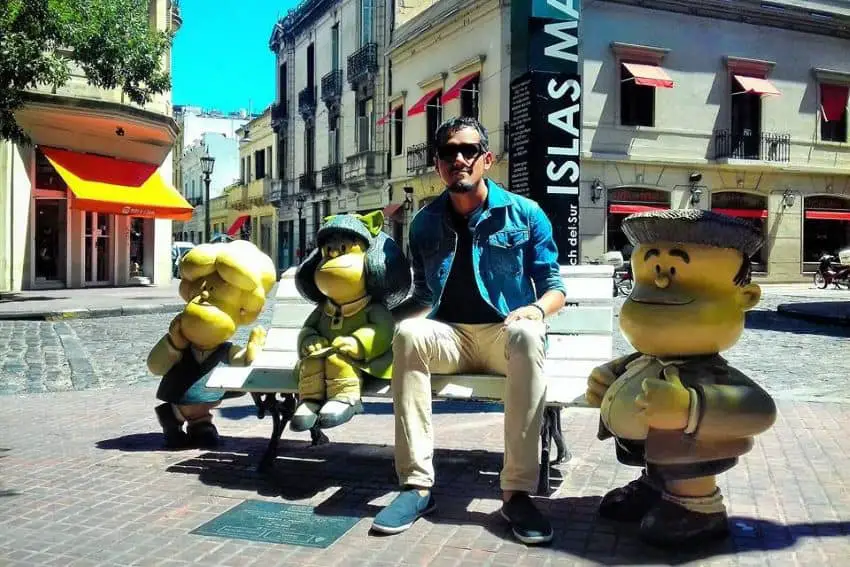

What makes Mafalda’s popularity in Mexico particularly fascinating is how her perspectives align with Mexican culture, even today. Though born in Argentina, her concerns about social justice, equality, and humanity’s future strike a universal chord. In a country struggling with complex social and political issues, Mafalda’s views are particularly relevant.
“The problem is that there are more people interested than interesting people,” Mafalda quips in one strip, addressing modern society’s self-absorption. Such observations feel as fitting in 2024 Mexico City as they did in 1960s Buenos Aires.
Mafalda’s challenges to gender norms resonate strongly in contemporary Mexico. As the country wrestles with machismo and women’s equality, Mafalda’s rejection of traditional female roles feels particularly relevant. Mafalda also advocates for work-life balance, often asking why life must revolve around work.
Her concern for peace and social justice strikes a chord in a nation familiar with violence and inequality. “Everywhere they bake beans, but nobody dares to strangle the maitre’d,” Mafalda observes, highlighting the gap between acknowledging problems and taking action. It’s a sentiment many Mexicans, frustrated with known corruption and systemic issues, relate to. She adds, “I like people that say what they think. But above all, I like people who do what they say.”
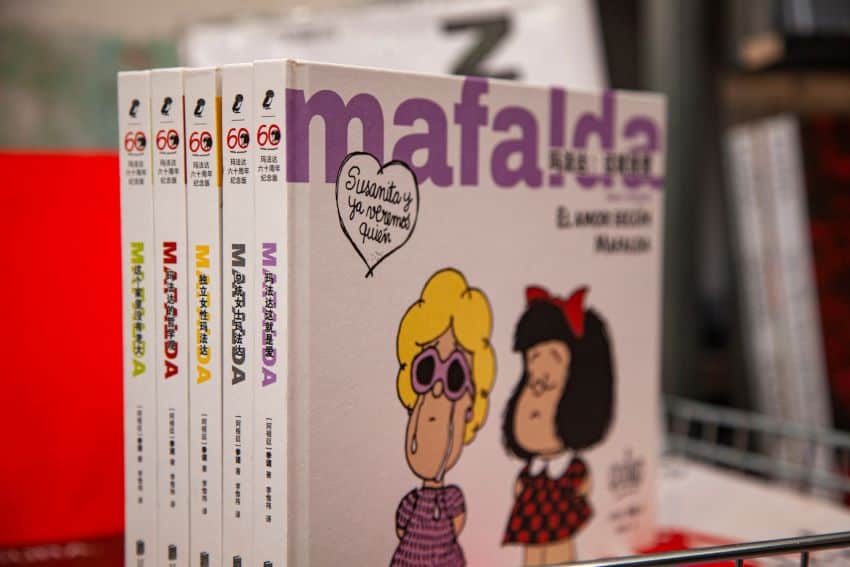

Beyond social commentary, Mafalda has become an educational tool in Mexico, her comics are used in schools to teach critical thinking and social awareness. Her sophisticated vocabulary and complex ideas, presented accessibly, introduce young readers to important concepts.
Mafalda Today
Mafalda’s comic strip run ended in 1973, though she may be poised for a resurgence. Netflix recently announced plans to develop new content based on the character, introducing her to a whole new generation of viewers.
As Mexico and the world grapple with issues of inequality, climate change, and political upheaval, Mafalda’s blend of optimism and pragmatism offers a voice of reason in a complex world.
“Wouldn’t it be more progressive to ask where we are going to go, instead of where we are going to stop?” Mafalda asks in one strip. It’s a question that could apply to any contemporary issues, from technological advancement to social change. By encouraging her readers to think critically, and empathetically and dream big, Mafalda continues to inspire generations of Mexicans to imagine a better world.
So next time when you encounter Mafalda, perhaps she’ll remind you to keep questioning, keep dreaming, and never stop working towards a better tomorrow. Just don’t try to make her eat any soup.
Monica Belot is a writer, researcher, strategist and adjunct professor at Parsons School of Design in New York City, where she teaches in the Strategic Design & Management Program. Splitting her time between NYC and Mexico City, where she resides with her naughty silver labrador puppy Atlas, Monica writes about topics spanning everything from the human experience to travel and design research. Follow her varied scribbles on Medium at https://medium.com/@monicabelot.
Source: Mexico News Daily

